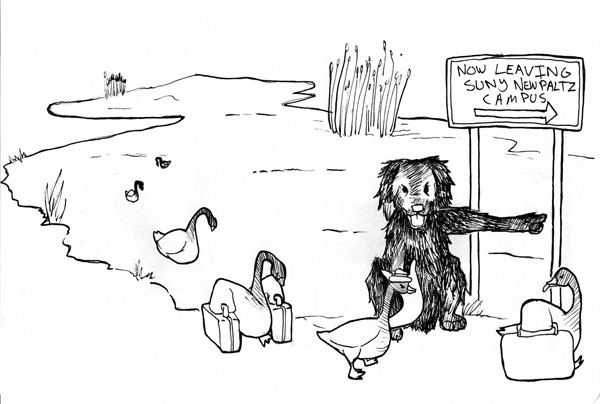

By this February, SUNY New Paltz may finally be among the many local universities that enjoy a clean, goose-free environment. With the help of a trained border collie purchased by the school, the safe removal of geese from campus is a realistic possibility – and we are in full support.
Even though these relatively tame birds add a guise of natural wildlife to the campus, they are not safe and do not belong here. By creating a makeshift habitat at a college comprised of nearly 7,000 students, multiple geese have already been struck and killed by motor vehicles. With their removal, the domestic geese currently living on campus will be given a safer home in the most humane way possible.
As students, we are tired of awkwardly hop scotching through campus pathways to avoid stepping in heaps of defecation. Some may think this fecal matter is good for our environment; however, by tracking excrement into our dorms, we are exposing ourselves to unhealthy bacteria and microorganisms. If a person casually put their feet up on a table and later ate food there, it could be a serious health risk.
Another indication of their unwanted presence comes from the intrusive sound these animals make while students living on campus are trying to sleep. It’s obnoxious and it’s a loud reminder of why this problem needs to be solved.
Currently, no one is assigned to take care of the domestic geese living on campus. With additional gaggles of non-domestic Canadian geese also populating the area, the problems have only gotten worse.
In partnership with the Wildlife Watch of New Paltz, Director of Environmental Health and Safety Mike Malloy plans to obtain a rescued border collie professionally trained to herd the geese. Once grouped, the flightless, domestic geese would be transported to a farm where they would be cared for and given veterinary care, while the visiting Canadian geese with the ability to take flight would be forced to move on to another location.
With the university’s current budgetary deficit, it may seem unwise spending $5,000 on a dog. However, with geese no longer living on campus, there would be tremendous savings in labor costs. Approximately six hours a week are spent cleaning the walkways on campus using a brush system. The equipment used for this method is costly to maintain and is required all too often.
When geese defecate on the athletic fields, a crew is required to perform an anti-microbial treatment. The artificial turf must be disinfected and cleaned so students are not sliding on it, getting bacteria in possible cuts or abrasions. With these processes no longer needed, large maintenance costs would essentially disappear.
By utilizing a border collie trained specifically to herd these birds, Vassar College has reduced their geese population from over 300 to zero. Backed by animal rights groups, Vassar’s proven goose-removal process has eliminated any problems associated with geese without a single animal hurt. Other schools have also taken action against geese using the same methods and have obtained success, including the Culinary Institute of America.
As they are herded, geese are not bitten or touched by the border collie, and the entire process will be monitored by Malloy. Any person afraid of dogs should feel secure in knowing that this animal will not be interested in students — only its job. Malloy has done extensive research in this process and we are confident that all precautions will be taken to ensure the safety of the students and the geese.
We know the removal of geese on campus is unexpected, but this is the best solution to a problem that we feel is too important to ignore. After the herding process is complete, the Gunk might even need a name change to something that sounds cleaner — but lets not count our goslings before they hatch.
